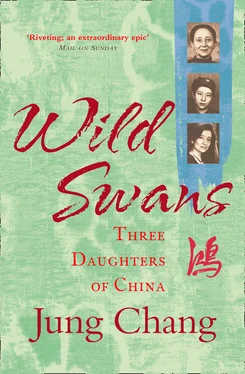The Lius were furious with my mother, and so were Dr Xia and my grandmother. For days they argued, pleaded, cajoled, shouted, and wept, to no avail. Finally, for the first time since he had hit her as a child for sitting in his seat on the kang , Dr Xia flew into a rage with my mother. ‘What you are doing is bringing shame on the name of Xia. I don’t want a daughter like you!’ My mother stood up and flung back the words: ‘All right, then, you won’t have a daughter like me. I’m leaving!’ She stormed out of the room, packed her things, and left the house.
In my grandmother’s time, leaving home like this would have been out of the question. There were no jobs for women, except as servants, and even they had to have references. But things had changed. In 1946 women could live on their own and find work, like teaching or medicine, although working was still regarded as the last resort by most families. In my mother’s school was a teacher training department which offered free board and tuition for girls who had completed three years in the school. Apart from an exam, the only condition for entry was that the graduates had to become teachers. Most pupils in the department were either from poor families who could not afford to pay for an education or people who did not think they had a chance to get into a university, and therefore did not want to stay on at the normal high school. It was only since 1945 that women could contemplate getting into a university; under the Japanese, they could not go beyond high school, where they were mainly taught how to run a family.
Up till now my mother had never considered going to this department, which was generally looked down on as second best. She had always thought of herself as university material. The department was a little surprised when she applied, but she persuaded them of her fervent wish to join the teaching profession. She had not yet finished her obligatory three years in the school, but she was known as a star pupil. The department gladly took her after giving her an exam which she passed with little difficulty. She went to live in the school. It was not long before my grandmother rushed over to beg her to come home. My mother was glad to have a reconciliation; she promised she would go home and stay often. But she insisted on keeping her bed on the campus; she was determined not to be dependent on anyone, however much they loved her. For her, the department was ideal. It guaranteed her a job after graduation, whereas university graduates often could not find jobs. Another advantage was that it was free—and Dr Xia was already beginning to suffer the effects of the mismanagement of the economy.
The Kuomintang personnel put in charge of the factories—those that had not been dismantled by the Russians—were conspicuously unsuccessful at getting the economy moving again. They got a few factories working at well below full capacity, but pocketed most of the revenue themselves.
Kuomintang carpetbaggers were moving into the smart houses which the Japanese had vacated. The house next door to the Xias’ old house, where the Japanese official had lived, was now occupied by an official and one of his newly acquired concubines. The mayor of Jinzhou, a Mr Han, was a local nobody. Suddenly he was rich—from the proceeds of property confiscated from the Japanese and collaborators. He acquired several concubines, and the locals began to call the city government ‘the Han household’, as it was bulging with his relatives and friends.
When the Kuomintang took Yixian they released my great-grandfather, Yang, from prison—or he bought his way out. The locals believed, with good reason, that Kuomintang officials made fortunes out of the ex-collaborators. Yang tried to protect himself by marrying off his remaining daughter, whom he had had with one of his concubines, to a Kuomintang officer. But this man was only a captain, not powerful enough to give him any real protection. Yang’s property was confiscated and he was reduced to living as a beggar—‘squatting by open drains’, as the locals called it. When she heard about this, his wife told her children not to give him any money or do anything to help him.
In 1947, a little more than a year after his release from jail, he developed a cancerous goitre on his neck. He realized he was dying and sent word to Jinzhou begging to see his children. My great-grandmother refused, but he kept sending messages entreating them to come. In the end his wife relented. My grandmother, Lan and Yu-lin set off for Yixian by train. It was ten years since my grandmother had seen her father, and he was a crumpled shadow of his former self. Tears streamed down his cheeks when he saw his children. They found it hard to forgive him for the way he had treated their mother—and themselves—and they spoke to him using rather distant forms of address. He pleaded with Yu-lin to call him Father, but Yu-lin refused. Yang’s ravaged face was a mask of despair. My grandmother begged her brother to call him Father, just once. Finally he did, through gritted teeth. His father took his hand and said: ‘Try to be a scholar, or run a small business. Never try to be an official. It will ruin you, the way it has ruined me.’ These were his last words to his family.
He died with only one of his concubines at his side. He was so poor he could not even afford a coffin. His corpse was put in a battered old suitcase and buried without ceremony. Not one member of his family was there.
Corruption was so widespread that Chiang Kai-shek set up a special organization to combat it. It was called the ‘Tiger-Beating Squad’, because people compared corrupt officials to fearsome tigers, and it invited citizens to send in their complaints. But it soon became apparent that this was a means for the really powerful to extort money from the rich. ‘Tiger-beating’ was a lucrative job.
Much worse than this was the blatant looting. Dr Xia was visited every now and then by soldiers who would salute punctiliously and then say in an exaggeratedly cringing voice: ‘Your honour Dr Xia, some of our colleagues are very short of money. Could you perhaps lend us some?’ It was unwise to refuse. Anyone who crossed the Kuomintang was likely to be accused of being a Communist, which usually meant arrest, and frequently torture. Soldiers would also swagger into the surgery and demand treatment and medicine without paying a penny. Dr Xia did not particularly mind giving them free medical treatment—he regarded it as a doctor’s duty to treat anyone—but the soldiers would sometimes just take the medicine without asking, and sell it on the black market. Medicines were in desperately short supply.
As the civil war intensified the number of soldiers in Jinzhou rose. The troops of the central command, which came directly under Chiang Kai-shek, were relatively well disciplined, but the others received no pay from the central government and had to ‘live off the land’.
At the teacher training department my mother struck up a close friendship with a beautiful, vivacious seventeen-year-old girl called Bai. My mother admired her and looked up to her. When she told Bai about her disenchantment with the Kuomintang, Bai told her to ‘look at the forest, not the individual trees’; any force was bound to have some shortcomings, she said. Bai was passionately pro-Kuomintang, so much so that she had joined one of the intelligence services. In a training course it was made clear to her that she was expected to report on her fellow students. She refused. A few nights later her colleagues in the course heard a shot from her bedroom. When they opened the door, they saw her lying on her bed, gasping, her face deathly white. There was blood on her pillow. She died without being able to say a word. The newspapers published the story as what was called a ‘peach-coloured case’, meaning a crime of passion. They claimed she had been murdered by a jealous lover. But nobody believed this. Bai had behaved in a very demure manner where men were concerned. My mother heard that she had been killed because she had tried to pull out.
Читать дальше












